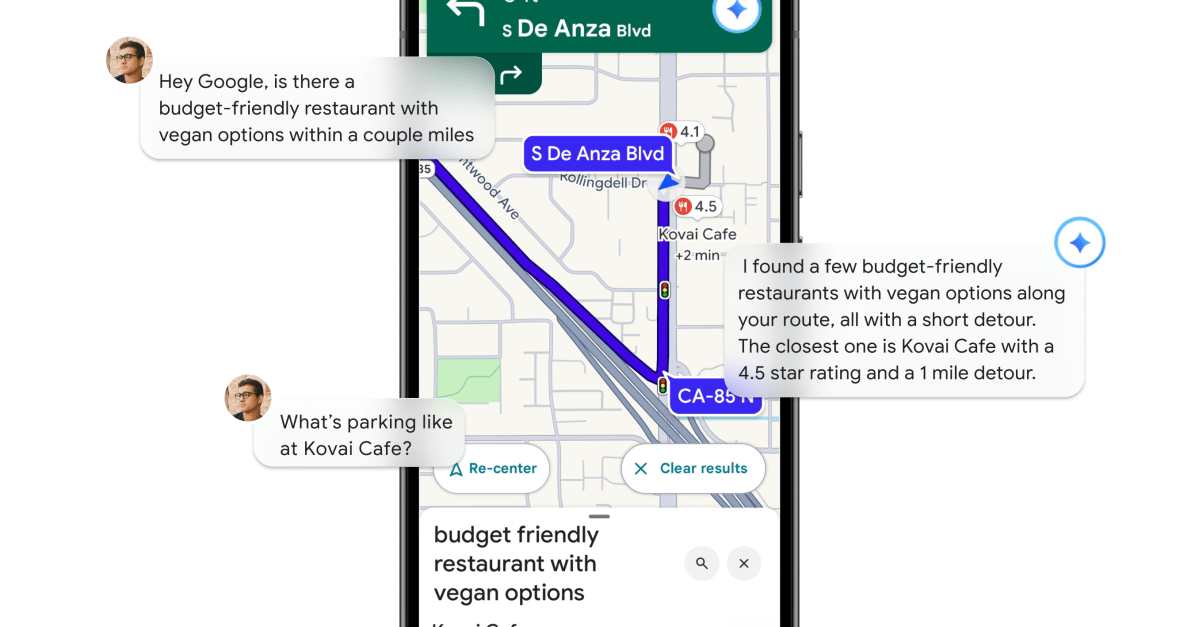Google Maps Adds Gemini AI to Serve as an All‑Knowing Navigation Copilot

Key Points
- Gemini AI now handles open‑ended navigation queries within Google Maps.
- Users can request restaurant recommendations and have routes adjusted automatically.
- The chatbot integrates with Calendar for in‑app reminder creation.
- Audible directions use visual landmarks drawn from billions of Street View images.
- Proactive Traffic Alerts monitor routes and warn of upcoming disruptions.
- Google Lens, powered by Gemini, identifies landmarks via camera input.
- Google stresses that Gemini’s answers are grounded in real‑world place data.
- Features will be free for signed‑in users and roll out across Android, iOS, and vehicles.
Google Maps is integrating Gemini, Google’s AI chatbot, into core navigation features. Users can now ask open‑ended questions, receive restaurant recommendations along a route, and have the route adjusted on the fly. Gemini also pulls data from Calendar, provides proactive traffic alerts, and powers visual cues in spoken directions using billions of Street View images and a massive place database. The system aims to deliver trusted, real‑world answers without hallucinations, offering a conversational, expert‑like experience directly within the Maps interface.
Gemini AI Enters Core Navigation Functions
Google Maps is expanding the role of Gemini, Google’s AI chatbot, beyond recent experimental features. The new integration lets users ask open‑ended questions while driving or walking, combining the platform’s geographic data with local community insights. For example, a user can request restaurant recommendations along a specified route and then have the route automatically updated to include directions to a chosen venue.
Conversational Interaction and Cross‑App Connectivity
Gemini can be summoned by voice or by tapping an icon in the top‑right corner of the Maps app. Once active, the chatbot can access other Google services such as Calendar, allowing users to add reminders for events while discussing navigation. This interoperability is designed to keep the interaction within the Maps interface, creating a seamless experience that feels like “a friend who’s a local expert in the passenger seat,” according to group product manager Vishal Dutta.
Enhanced Audible Directions and Visual Cues
The AI also improves audible directions by referencing recognizable visual landmarks—such as gas stations, restaurants, and distinctive structures—rather than relying solely on distance‑based instructions. This capability draws on Gemini’s ability to process billions of Street View images and cross‑reference them with a live index of 250 million places logged in Google Maps.
Proactive Traffic Alerts
Google introduces Proactive Traffic Alerts, which monitor routine commutes and familiar drives in the background. Gemini can automatically notify users of approaching disruptions like crashes, construction, or road closures, giving drivers enough time to reroute and stay on schedule.
Google Lens Integration
Within Maps, users can now employ Google Lens powered by Gemini to identify surrounding landmarks or businesses. Pointing a camera at a location triggers a natural‑language conversation that provides detailed information about the scene.
Commitment to Accuracy
Google emphasizes that Gemini’s navigation answers are grounded in real‑world datasets to avoid hallucinations. Product director Amanda Moore notes that place information used for routing comes directly from actual place data, ensuring reliable recommendations.
Rollout and Availability
The new Gemini‑enhanced features will be free for all signed‑in users and will roll out gradually to Android, iOS, and eventually vehicles equipped with Google‑built‑in systems.